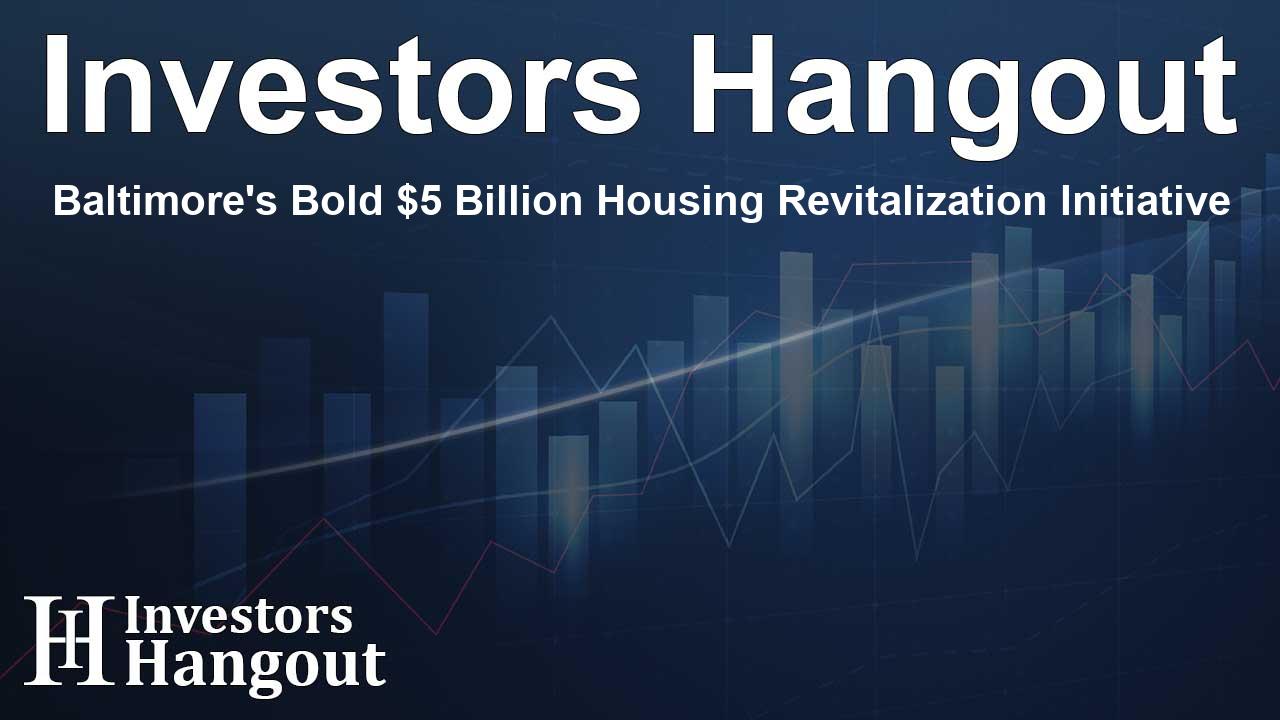Baltimore's Bold $5 Billion Housing Revitalization Initiative

Baltimore's Vision for Housing Redevelopment
Baltimore is embarking on a transformative plan aimed at revitalizing its neighborhoods through a comprehensive housing redevelopment initiative. This multi-billion dollar effort is poised to address the significant number of vacant properties across the city, positioning Baltimore at the forefront of community investment and urban renewal strategies.
Addressing Vacancy and Revitalization
With a goal to eliminate tens of thousands of vacant properties, Baltimore's 15-year strategy is recognized as the largest community investment initiative in its history. By revitalizing over 37,000 properties, the city aims to spur economic growth and enhance the quality of life for its residents. The plan includes leveraging up to $5 billion from private-sector financing alongside $1.2 billion in public investment commitments.
Community Engagement and Support
Mark Anthony Thomas, president of the Greater Baltimore Committee (GBC), emphasized the importance of community collaboration in this initiative. He noted that investing in housing stability and neighborhood vitality goes beyond mere construction; it is about cultivating a sense of belonging and stability within the community. By harnessing civic leadership and private capital, Baltimore is establishing a new standard for urban revitalization in the nation.
A Holistic Approach to Development
Unlike past initiatives that focused solely on individual buildings, Baltimore's strategy takes a more holistic approach. The plan seeks to revitalize neighborhoods by aligning investments in housing with improvements in infrastructure, public spaces, and commercial areas. This comprehensive outlook is designed to enhance overall community health and appeal.
The Role of Local Government
The Mayor's Office and various community partners, including BUILD Baltimore, are driving this ambitious strategy. Governor Wes Moore's executive order has further catalyzed efforts to maximize the program's impact through efficient collaboration between local and state entities. Public funding is being strategically used to attract additional private investment, ensuring sustainable growth.
Financial Commitments and Projections
As part of its long-term vision, Baltimore has secured significant financial backing: $300 million from the city itself and $900 million pledged by the state. This crucial funding will facilitate immediate improvements and address the challenges associated with vacant properties. Ultimately, the goal is to reach a total of $3 billion in public funding over the next 15 years.
Quantifying Economic Impact
Experts project that Baltimore's redevelopment plan could create an estimated $7.3 billion in economic value over the next 30 years. This figure reflects potential increases in tax revenue, job creation, and rising property values resulting from the revitalized neighborhoods. The financial forecast underscores the initiative's potential to reshape the city’s economic landscape positively.
Capital Strategy and Future Planning
To further support its ambitious goals, the GBC is actively seeking partners through a Request for Information (RFI) aimed at designing a private capital strategy. This comprehensive plan seeks to mobilize investment that aligns with Baltimore's market needs while also addressing public priorities.
Learning from Successful Models
The lessons learned from successful models, such as ReBUILD Metro in East Baltimore, serve as valuable references for this citywide initiative. The ReBUILD Metro project has shown that focused efforts can dramatically reduce vacancy rates while increasing community engagement and local economies.
About the Greater Baltimore Committee
The GBC plays a critical role in steering economic and civic leadership for Baltimore’s future. With over 300 partners, the committee is committed to fostering growth and creating a thriving environment for all residents. The recent launch of the "Bold Moves" initiative illustrates their dedication to attracting businesses and innovations that will enrich the Greater Baltimore region.
Frequently Asked Questions
What is the goal of Baltimore's housing redevelopment initiative?
The initiative aims to eliminate vacant properties, revitalize neighborhoods, and create a sustainable community investment over 15 years.
How will this program impact local communities?
This program is expected to improve housing stability, enhance neighborhood vitality, and increase quality public spaces.
What has been secured to fund this effort?
Baltimore has secured $300 million from the city and $900 million from the state to support the redevelopment initiative.
How will private-sector investment be leveraged?
The city aims to leverage up to $5 billion in private-sector financing alongside public investments to maximize redevelopment efforts.
What past programs inform this strategy?
Programs like ReBUILD Metro have offered insights into effective strategies for reducing vacancy rates and revitalizing communities successfully.
About The Author
Contact Riley Hayes privately here. Or send an email with ATTN: Riley Hayes as the subject to contact@investorshangout.com.
About Investors Hangout
Investors Hangout is a leading online stock forum for financial discussion and learning, offering a wide range of free tools and resources. It draws in traders of all levels, who exchange market knowledge, investigate trading tactics, and keep an eye on industry developments in real time. Featuring financial articles, stock message boards, quotes, charts, company profiles, and live news updates. Through cooperative learning and a wealth of informational resources, it helps users from novices creating their first portfolios to experts honing their techniques. Join Investors Hangout today: https://investorshangout.com/
The content of this article is based on factual, publicly available information and does not represent legal, financial, or investment advice. Investors Hangout does not offer financial advice, and the author is not a licensed financial advisor. Consult a qualified advisor before making any financial or investment decisions based on this article. This article should not be considered advice to purchase, sell, or hold any securities or other investments. If any of the material provided here is inaccurate, please contact us for corrections.
